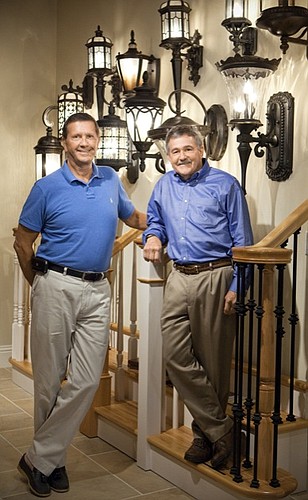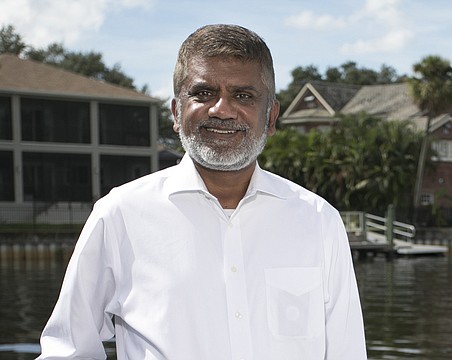For a man who runs a company that lost a substantial chunk of revenues in the recession, Lee Wetherington is surprisingly content, if not downright cheerful.
The sales plunge at Lee Wetherington Homes has nonetheless been undeniably painful.
The company sat at $112.74 million in annual sales in 2006. By 2010 the figure was $6.69 million — a 94% drop over five years. On a percentage basis, the largest drop of the five-year period occurred last year, when sales fell 64.7%, from $18.95 million in 2009 to the $6.69 million figure.
But a sales collapse only a plays a supporting role in the Lee Wetherington Homes story. In fact, the story is more about survival and perseverance.
“I just feel really good to be sitting here with a company that still exists,” says Wetherington. “It doesn't get any better than that.”
Back in 2008, though, Wetherington faced a mortal crisis. For starters, the days of 400 home sales a year, like the firm did earlier in the 2000s, were long gone.
Not gone: the debt the company owed to banks on multiple land deals in the Sarasota-Manatee region. “We bought the land for what we thought was good, conservative prices,” says Bill Hager, CEO of Lee Wetherington Homes.
The recession shattered the land values. And at the same time, potential homebuyers were scarce, so less money was coming in. It wasn't long before the banks came calling.
“We had enough cash to last us a while,” says Wetherington. “But we didn't expect land values to drop and to have the banks make a cash call.”
Wetherington hired a group of consultants and attorneys in December 2008 to devise a strategy that would save the firm he started in 1981. A Jacksonville native, Wetherington, 64, has been in the homebuilding or construction business since the early 1970s. “We never considered bankruptcy,” he says. “That wasn't in our game.”
The game, instead, was Wetherington had to reach deep into his personal finances — money saved up over years of running a profitable firm. He also had to return some land to the banks.
It was a trying time. “We went through the hounds of hell,” says Wetherington. “I wasn't going to give up.”
After two stressful years of meetings, paperwork and negotiations, Wetherington finally completed the mission late last year, just before Christmas. He reached confidential deals with three banks, Fifth Third, SunTrust and BB&T, to pay off debt and return land.
Wetherington spent between $5 million and $10 million of his own money to cover the payment side of the deals. Costly, but the relief was so palpable after he signed the last deal, on Dec. 17, that Wetherington recalls he felt like a man who had just been cured of a terrible disease.
Ownership plan
Getting whole with the banks, it turns out, was only the first step in the recovery process. The second step was an employee ownership plan for Lee Wetherington Homes.
Wetherington says the idea was to create an employee-owned company with no debt. A single man with no children, Wetherington also says employee ownership sets up a transition and succession plan for the company.
The employee ownership process took about a year to complete. It helped that the firm had substantially fewer employees to work with, from around 100 at the peak to 13 now.
The employee-ownership plan was officially launched Jan. 1. It provides an opportunity for six managers and top employees to buy into 20% of the company. Wetherington, at least in the beginning, will hold on to 80%. “It was a pretty easy sell,” Hager says, “because the employees now feel like they are part of something.”
The program can change over time. If employees meet certain performance thresholds, they can buy more shares. But Wetherington will always remain the majority shareholder, says Hager.
One twist to the program is some of the money Wetherington earns from selling shares will go directly into a foundation he established in 2002. The organization, run through the Community Foundation of Sarasota County, awards grants and other funds to groups and residents in the Sarasota-Bradenton area, with a focus on youth. Wetherington has donated more than $3 million to the foundation in previous years.
'High style'
The third step in the revival process is much closer to Wetherington's heart: building homes.
Wetherington comes from a family of contractors, people who worked mostly in drywall and painting homes. Wetherington served in the U.S. Marines in his early 20s, seeing combat in the Vietnam War. Soon after the war, Wetherington took over his uncle's drywall contracting business.
By 1981 Wetherington was in Sarasota, in business for himself. Within a decade, Wetherington had gone from a startup to one of the region's most well known homebuilders. His company even spawned other businesses, including a pool construction firm.
Wetherington's true love, however, is the home design and build process. Even today, the best part of his workday is when he visits a site and takes pictures of a work-in-progress on his cell phone. “We've always had little bit of a niche,” Wetherington says. “We build with a higher quality and a higher style.”
Buyers who seek that kind of home are a dwindling lot these days, of course, which is partially why the business was in its debt-laden predicament. But Wetherington says the firm's core strategy, to build higher-quality homes, remains intact.
In doing so, the company made some internal changes to meet the new market. Wetherington renegotiated with vendors, for example, and accepted lower margins. The firm also kept its subcontractors, which paid off in terms of keeping consistent quality, says Wetherington.
“We don't have to be the biggest (firm) anymore,” Wetherington says. “We want to build a better house.”
To that end, the firm has spread its price point. It now sells new homes that range in price from $300,000 to more than $1.5 million. It builds mostly in Lakewood Ranch, in east Manatee County.
The firm's target customer, says Hager, remains the younger side of baby boomers.
“Now that we don't have to deal with the banks,” says Wetherington, “we can focus on growth and strategy.”






